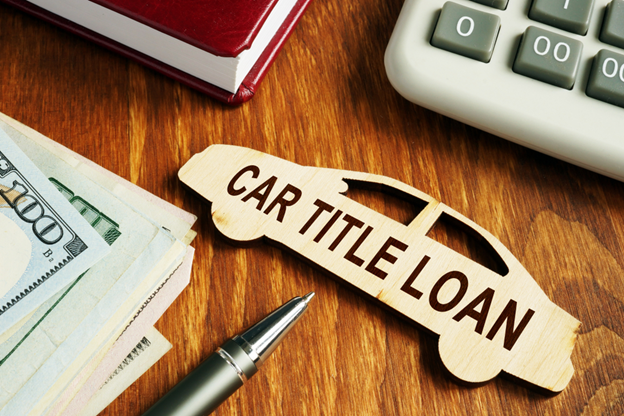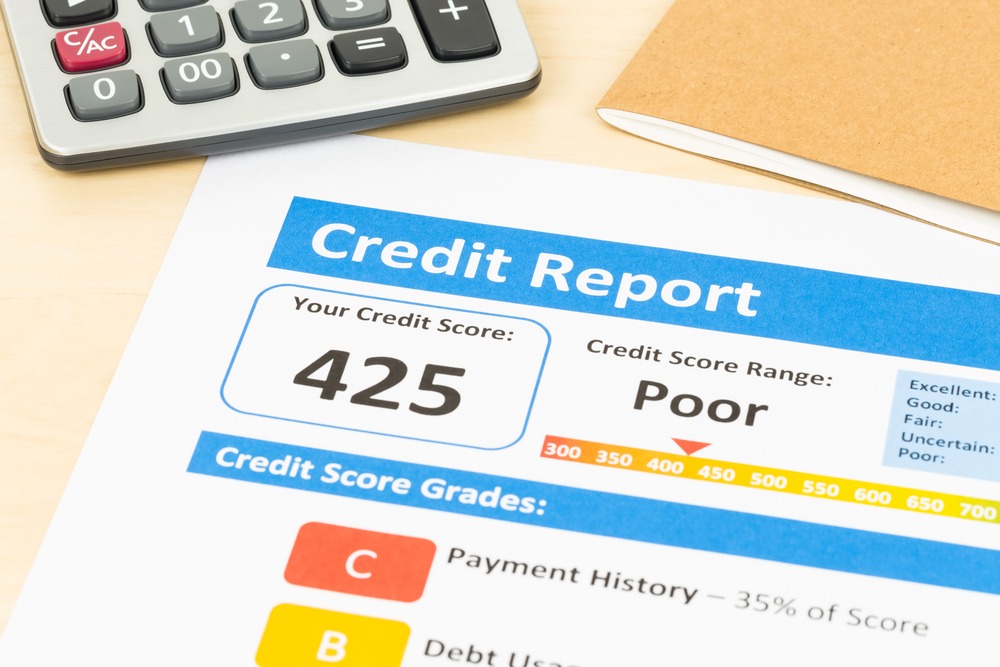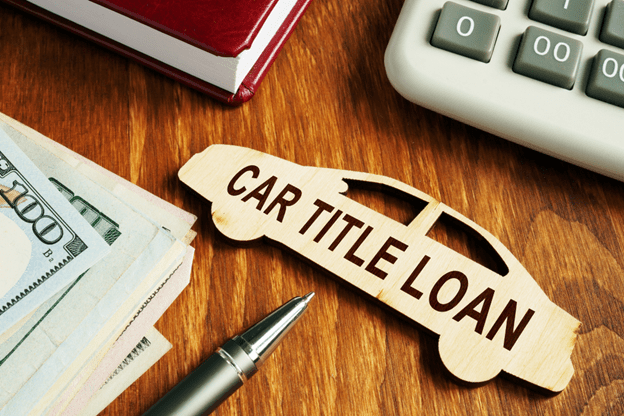Title loans, often referred to as car title loans, have become a popular financial solution for those in need of quick cash. Typically secured by the borrower’s vehicle title, these loans are appealing due to their minimal qualification requirements and rapid processing times. This accessibility makes title loans a go-to option for individuals facing immediate financial burdens who may not qualify for more traditional loans.

However, the convenience of title loans comes with significant risks, particularly concerning the borrower’s credit health. One of the most critical aspects that potential borrowers must consider is the impact of defaulting on a title loan. Defaulting can not only lead to the loss of one’s vehicle—a dire consequence on its own—but it can also have a severe and lasting effect on an individual’s credit history and credit report.
This article delves deep into the repercussions that defaulting on a title loan can have on your credit score and overall credit report. Understanding these impacts is essential for anyone considering a title loan, as well as for those who currently have one and are struggling with repayments. We will explore how title loans work, what happens if you default, and how such events are recorded by credit bureaus, ultimately affecting your financial credibility and access to future borrowing.
What Is a Title Loan?
A title loan, also known as an auto title loan, is a type of secured loan where borrowers use their vehicle as collateral. These loans are particularly accessible to individuals who need immediate financial assistance and may not have the credit score required for traditional loans. The amount one can borrow depends largely on the value of the vehicle. To obtain a title loan, the borrower must provide the lender with a clear title to their vehicle. If the borrower fails to repay the loan, the lender has the right to seize the vehicle to cover the outstanding debt.

Common Terms in a Title Loan Agreement
Title loan agreements are binding contracts between the lender and the borrower. These documents outline several critical terms, such as the loan amount, interest rate, repayment schedule, and consequences of non-payment. Key terms also include title loan payments, which specify the amount and frequency of payments, and the loan contract provisions that detail the rights and responsibilities of each party involved. Understanding these terms is crucial as they directly impact how the loan operates and what happens in the event of defaults or other issues.
The Credit Impact of Defaulting on Title Loans
How Defaulting Affects Your Credit Score?
Defaulting on a title loan can significantly impact your credit score, often with long-lasting negative effects. When a borrower fails to make payments according to the loan agreement, the lender may report this delinquency to the credit bureaus. These entities, including Equifax, Experian, and TransUnion, track and record credit activities in your credit report.

Once the default is reported, it is documented as a negative entry on your credit report. This entry can substantially decrease your credit score because payment history is a major factor influencing credit score calculations. A lower score results from any reported default because it signals to potential lenders that you pose a higher risk.
Additionally, the presence of a default can make obtaining future credit more difficult and expensive, as lenders often charge higher interest rates or require more stringent loan terms to mitigate their risk.
Moreover, since title loans are secured with the borrower’s vehicle, defaulting could lead to repossession. This adds another layer of negative impact, as the repossession itself can also be recorded on your credit report, further damaging your credit score and affecting your ability to borrow in the future.
Long-Term Consequences on Credit Reports
The effects of defaulting on a title loan extend beyond just an initial drop in your credit score. A default can remain on your credit report for up to seven years. During this period, it continues to influence lenders’ perceptions of your reliability as a borrower. The presence of a default on your credit report can lead to several long-term consequences:
- Increased Difficulty in Securing Loans: With a poor credit report, banks and other financial institutions may be hesitant to offer loans. If they do, the terms are often less favorable, with higher interest rates and stricter loan terms.
- Higher Insurance Premiums: Many people don’t realize that their credit score can also affect their insurance premiums. Insurers often use credit information to determine risk levels and pricing, meaning that a lower credit score can lead to higher premiums.
- Impact on Employment Opportunities: In some cases, employers check credit reports as part of the hiring process, especially for positions that involve financial responsibilities. A poor credit history can limit job opportunities or advancement.
- Difficulty in Renting Housing: Landlords may check credit reports to screen potential tenants. A history of poor credit, especially including defaults, can make it more difficult to rent an apartment or house, as landlords may view you as a financial risk.
Repairing credit after a default is challenging but not impossible. It involves consistently making payments on time, reducing overall debt levels, and possibly working with credit counseling services. Understanding these long-term consequences can motivate borrowers to manage their title loans more carefully, ensuring timely payments and avoiding the severe repercussions of defaulting.
The Process of Default and Repossession
What Happens When You Default?
When a borrower defaults on a title loan, several steps are taken by the lender to address the situation, often culminating in the repossession of the vehicle used as collateral. The process typically begins with the borrower missing a payment, which immediately puts the loan in default status as per most title loan agreements.
Initially, the lender will send a written notice to the borrower. This notice serves as a formal warning that the loan has defaulted and outlines the consequences if the default is not rectified. It provides details on the amount owed, including any late fees accrued, and often offers a narrow window for the borrower to catch up on missed payments. This phase is crucial as it represents the last opportunity for borrowers to address the situation before further actions are taken.
If the borrower fails to make the necessary payments within the specified timeframe, the lender moves forward with vehicle repossession. The repossession process involves the lender taking physical possession of the car, either directly or through a third-party agency. Once repossessed, the vehicle is typically sold at auction, with the proceeds used to cover the unpaid loan balance and any related fees. This step not only strips the borrower of their vehicle but also adds a serious mark against their credit record, which can have long-standing repercussions.
Avoiding Repossession and Its Benefits
Avoiding the repossession of a vehicle due to a title loan default is crucial not only for retaining the asset but also for maintaining financial health and a good credit score. The first strategy to avoid repossession is to communicate proactively with the lender if you anticipate difficulties in making payments. Many lenders prefer to find a payment plan solution rather than repossess the vehicle, as it is often less costly and keeps the loan in a performing state.
Borrowers can also explore refinancing the title loan with another lender. This option can offer more favorable terms, including lower interest rates and a more manageable repayment schedule, which can reduce the likelihood of default. Another strategy is to seek financial counseling from professionals who can offer insights and strategies to manage debt more effectively.
The benefits of avoiding repossession extend beyond retaining the vehicle. By maintaining timely payments, borrowers can positively influence their credit score. Regular, on-time payments contribute positively to credit history, one of the primary factors in credit scoring models.
Keeping the loan in good standing avoids the negative impacts of defaults and repossessions on credit reports, thus preserving the borrower’s ability to secure future credit under favorable terms. This proactive management of debt underscores responsible borrowing and reflects positively on one’s financial records, enhancing creditworthiness in the long run.
Comparing Title Loans with Other Secured Loans
Title Loans vs. Other Personal Loans
Title loans and other secured personal loans share a fundamental characteristic: both require collateral. However, the nature of the collateral and the terms of the loans can vary significantly. For instance, secured personal loans might be backed by a savings account, real estate, or other valuable assets, whereas title loans specifically use a vehicle as collateral.
Interest rates for title loans are typically higher than those for other secured personal loans. This is because title loans often cater to individuals with lower credit scores or those who need immediate cash. The riskier nature of lending to such clients justifies higher rates from the lender’s perspective. In contrast, other secured loans, backed by more stable assets like property, generally offer lower interest rates and longer repayment periods, making them less costly over time.
Credit requirements for title loans are also considerably lower. Lenders of traditional secured loans usually require a thorough credit check and may demand a good credit history, while title loan providers often skip a formal credit check, focusing instead on the value and condition of the vehicle.
The Risks of Payday Loans and Auto Title Loans
Payday loans and auto title loans are both considered high-risk financial products, but they cater to different needs and carry unique risks. Payday loans are unsecured loans that are typically due on the borrower’s next payday. They often feature extremely high interest rates, which can trap borrowers in a cycle of debt if the loan is not repaid on time.
Auto title loans, while similarly high in interest rates, are secured by the borrower’s vehicle. This can pose a significant risk of losing one’s car, a critical asset for personal transportation and, for many, a means to earn a living. The threat of repossession can have far-reaching consequences beyond the immediate financial strain.
Both types of loans can lead to a deterioration of the borrower’s financial situation if not managed carefully. High fees and interest rates, combined with short repayment terms, can quickly escalate into an unmanageable debt situation. Borrowers should consider these risks carefully when choosing between these and other financing options.
Financial Strategies to Manage or Avoid Title Loans
Alternatives to Taking a Title Loan
When faced with immediate cash needs, considering alternatives to title loans can be crucial due to the lower risks and potentially less stringent financial consequences. One of the most accessible options is a personal loan from a bank or credit union. These loans are typically unsecured and based on your credit score, but some financial institutions also offer secured versions with lower interest rates. Personal loans generally provide longer repayment periods and lower interest rates compared to title loans, making them a more manageable option for many individuals.

Another alternative is borrowing money from friends or family. This can often be arranged with no or very low interest and more flexible repayment terms. Although it requires careful handling to maintain healthy relationships, it’s a viable option for many without the risks associated with title loans.
Credit cards can also serve as a quick source of funds, especially if you can pay off the balance before high interest accrues. Some credit cards offer cash advances which, despite higher interest rates than regular purchases, still come in below the rates for title loans. Lastly, community assistance programs or emergency funds from nonprofits may be available to those in dire financial situations, providing an essential lifeline without the need to pledge assets as collateral.
Managing Debt to Prevent Loan Default
Effectively managing debt is essential to avoid the necessity of resorting to high-risk loans like title loans. One critical strategy is to maintain a clear and comprehensive budget that tracks all income and expenses. This budgeting process helps identify potential savings areas, reducing the need to borrow and allowing for timely bill payments.
Prioritizing debts is another important aspect of debt management. Pay high-interest debts first as they accumulate interest quickly, adding to your total debt load. Making timely payments on all debts is crucial; even small payments on time are better than larger payments made occasionally late. This approach not only keeps the debt from growing due to late fees and increased interest rates but also helps maintain a healthy credit score.
Consider consulting with a credit counselor if managing your debts becomes overwhelming. These professionals can offer personalized advice and might suggest a debt management plan. Such plans can consolidate your debts into a single payment with a reduced interest rate, making it easier to manage monthly payments and avoid falling into default.
Lastly, setting aside an emergency fund, even if it’s small, can provide a buffer against financial surprises that might otherwise lead you to consider a high-risk loan like a title loan. By building and maintaining this fund, you ensure you have resources to cover unexpected expenses without compromising your financial health.
Impact of Title Loans on Financial Goals
Balancing Quick Cash Needs with Long-Term Goals
Navigating the delicate balance between immediate financial needs and long-term financial goals is crucial. While title loans provide quick cash, which can be tempting during a financial emergency, they should be approached with caution due to their potential to undermine future financial stability. Traditional lenders typically offer alternatives that might take longer to secure but come with lower interest rates and more manageable repayment plans, aligning better with long-term financial objectives.
It’s important to assess the urgency of the need for cash and consider if there are other options that could be explored first. For example, selling unused items or reducing discretionary spending can generate some immediate funds without incurring debt.
Additionally, if borrowing is unavoidable, exploring options like personal loans from banks or credit unions may offer more favorable terms. These methods help preserve financial goals like saving for a home or retirement, which might be jeopardized by the high costs associated with title loans.
How Title Loans Can Derail Financial Planning
Title loans can significantly derail financial planning due to their high interest rates and the risk of repossession. The immediate relief experienced when receiving the loan can quickly turn into long-term financial stress if not managed properly. The costs associated with title loans often extend beyond the principal and interest payments. Additional fees for processing, late payments, and repossession can accumulate, exacerbating the borrower’s financial strain.
Relying on title loans repeatedly can create a cycle of debt that is difficult to escape. Each loan cycle can lead to more fees and an ever-increasing debt load, making it harder to meet monthly expenses and save for future goals. This can force borrowers to prioritize loan repayments over other financial commitments, such as saving for emergencies or investing for long-term growth.
Ultimately, this jeopardizes financial security and can delay or prevent the achievement of significant financial milestones, such as purchasing a home or building retirement savings. Careful consideration and management of one’s financial situation are essential to avoid the serious consequences that can arise from depending on title loans.
Legal Aspects and Consumer Rights in Title Loans
Understanding Your Rights as a Borrower
When entering into a title loan agreement, it’s crucial for borrowers to understand their rights to ensure they are not exploited and to protect their assets. These rights are typically outlined in the loan agreement, which should clearly specify the terms of the loan, including the loan amount, interest rate, repayment schedule, and the actions the lender can take if the borrower defaults. Legal protections for borrowers vary by state but generally include the right to receive a clear and concise explanation of the terms of the loan and any fees charged.
Borrowers also have the right to know the implications of failing to make payments on time and the procedures involved in the repossession of the vehicle. Many states require lenders to provide notice before repossessing any collateral and may provide a grace period for the borrower to catch up on overdue payments. Understanding these rights can empower borrowers to make more informed decisions and to seek legal recourse if they believe their rights have been violated.
Consequences of Violating Loan Agreements
Violating the terms of a title loan agreement can lead to severe legal consequences for the borrower. If a borrower fails to make timely payments as specified in the loan agreement, they are in default of the contract, which activates the lender’s right to take remedial actions, including repossessing the vehicle used as collateral. Upon repossession, the lender typically has the right to sell the vehicle to recover the unpaid loan amount. If the sale does not cover the entire debt, the borrower might still be liable for the remainder, known as a deficiency balance.
Additionally, defaulting on a loan can lead to legal actions from the lender, such as a lawsuit for the outstanding loan balance. This can further impact the borrower’s financial situation by potentially leading to wage garnishment or seizure of assets.
Defaulting on a title loan and suffering through its consequent legal processes also damages the borrower’s credit score significantly, affecting future loan eligibility and terms. Therefore, understanding and adhering to the loan agreement is not only critical to avoiding these harsh consequences but also crucial for maintaining overall financial health.
How Title Loans Affect Different Credit Profiles
Effects on Someone with Good Credit
Individuals with good credit scores often enjoy lower interest rates and better loan terms due to their proven track record of financial reliability. However, opting for a title loan can put this favorable standing at risk. For someone with a good credit rating, taking out a title loan — typically characterized by high interest rates and risky terms — might seem like a manageable quick-fix solution.
Yet, the potential negative impact of such a decision can be significant. Defaulting on a title loan can lead to a considerable drop in credit score, tarnishing an otherwise clean credit history. This can shift an individual’s credit status from good to poor, making future financial transactions more complicated and more expensive.
Effects on Someone with Poor Credit
For individuals with poor credit, obtaining any loan is challenging, often leading to acceptance of high-risk loans like title loans. These loans generally do not require a credit check, making them accessible but perilously expensive. The high interest rates associated with title loans can exacerbate an already fragile financial situation.
If a person with poor credit defaults on a title loan, this further damages their credit history, making recovery and access to better credit options increasingly difficult. The cycle of poor credit is perpetuated, hindering long-term financial stability and making credit repair an arduous task.
The Role of Credit Bureaus in Title Loan Defaults
Credit bureaus play a critical role in maintaining financial records, including tracking and reporting loan defaults. When a borrower defaults on a title loan, the lender typically reports this event to one or more credit bureaus. This entry on the borrower’s credit report can negatively affect their credit history, reflecting poor financial management and increased credit risk to potential lenders. The default remains on the credit report for up to seven years, impacting the borrower’s ability to obtain future credit, secure housing, and sometimes even employment.
Mitigating the Impact of Title Loan Defaults on Your Credit
Title loans, while providing immediate financial relief, come with high stakes, particularly concerning one’s credit health. The repercussions of defaulting on such loans extend beyond simple financial inconvenience, potentially derailing personal and financial goals for years.
To mitigate the impact of a title loan default on your credit, consider proactive steps such as negotiating with the lender for modified payment plans or refinancing the loan under more manageable terms. If default has already occurred, focus on rebuilding your credit by ensuring all other debts are paid on time, gradually paying down outstanding balances, and perhaps consulting with a credit counseling service.
Credit repair is a gradual process, but with consistent effort and careful financial planning, recovery is within reach. These strategies are essential not only for recovering from past financial mistakes but also for laying a solid foundation for future financial stability.
